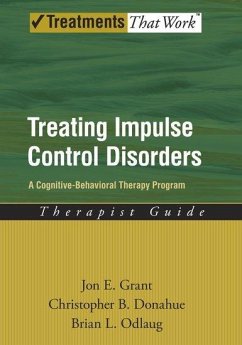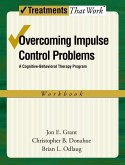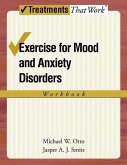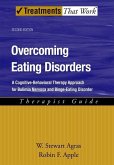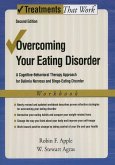Jon E. Grant, Christopher B. Donahue, Brian L. Odlaug
Treating Impulse Control Disorders
A Cognitive-Behavioral Therapy Program, Therapist Guide
Jon E. Grant, Christopher B. Donahue, Brian L. Odlaug
Treating Impulse Control Disorders
A Cognitive-Behavioral Therapy Program, Therapist Guide
- Broschiertes Buch
- Merkliste
- Auf die Merkliste
- Bewerten Bewerten
- Teilen
- Produkt teilen
- Produkterinnerung
- Produkterinnerung
This guide includes all the information and materials necessary to implement a successful cognitive behavioral therapy program for impulse control disorders (CBT-ICD).
Andere Kunden interessierten sich auch für
![Overcoming Impulse Control Problems Overcoming Impulse Control Problems]() Jon E. GrantOvercoming Impulse Control Problems41,99 €
Jon E. GrantOvercoming Impulse Control Problems41,99 €![Trauma, Dissociation, And Impulse Dyscontrol In Eating Disorders Trauma, Dissociation, And Impulse Dyscontrol In Eating Disorders]() P. E. R.Trauma, Dissociation, And Impulse Dyscontrol In Eating Disorders216,99 €
P. E. R.Trauma, Dissociation, And Impulse Dyscontrol In Eating Disorders216,99 €![Studies in the Psychology of Sex: Analysis of the Sexual Impulse; Love and Pain; The Sexual Impulse in Women; Volume 3 Studies in the Psychology of Sex: Analysis of the Sexual Impulse; Love and Pain; The Sexual Impulse in Women; Volume 3]() Havelock EllisStudies in the Psychology of Sex: Analysis of the Sexual Impulse; Love and Pain; The Sexual Impulse in Women; Volume 338,99 €
Havelock EllisStudies in the Psychology of Sex: Analysis of the Sexual Impulse; Love and Pain; The Sexual Impulse in Women; Volume 338,99 €![Exercise for Mood and Anxiety Disorders Exercise for Mood and Anxiety Disorders]() Jasper A. J. SmitsExercise for Mood and Anxiety Disorders35,99 €
Jasper A. J. SmitsExercise for Mood and Anxiety Disorders35,99 €![Applications of the Unified Protocol for Transdiagnostic Treatment of Emotional Disorders Applications of the Unified Protocol for Transdiagnostic Treatment of Emotional Disorders]() Applications of the Unified Protocol for Transdiagnostic Treatment of Emotional Disorders51,99 €
Applications of the Unified Protocol for Transdiagnostic Treatment of Emotional Disorders51,99 €![Overcoming Eating Disorders Overcoming Eating Disorders]() W. Stewart AgrasOvercoming Eating Disorders48,99 €
W. Stewart AgrasOvercoming Eating Disorders48,99 €![Overcoming Your Eating Disorders Overcoming Your Eating Disorders]() Robin F. AppleOvercoming Your Eating Disorders42,99 €
Robin F. AppleOvercoming Your Eating Disorders42,99 €-
-
-
This guide includes all the information and materials necessary to implement a successful cognitive behavioral therapy program for impulse control disorders (CBT-ICD).
Hinweis: Dieser Artikel kann nur an eine deutsche Lieferadresse ausgeliefert werden.
Hinweis: Dieser Artikel kann nur an eine deutsche Lieferadresse ausgeliefert werden.
Produktdetails
- Produktdetails
- Verlag: Oxford University Press
- Seitenzahl: 176
- Erscheinungstermin: 1. Februar 2011
- Englisch
- Abmessung: 254mm x 178mm x 10mm
- Gewicht: 344g
- ISBN-13: 9780199738793
- ISBN-10: 0199738793
- Artikelnr.: 32460542
- Herstellerkennzeichnung
- Libri GmbH
- Europaallee 1
- 36244 Bad Hersfeld
- gpsr@libri.de
- Verlag: Oxford University Press
- Seitenzahl: 176
- Erscheinungstermin: 1. Februar 2011
- Englisch
- Abmessung: 254mm x 178mm x 10mm
- Gewicht: 344g
- ISBN-13: 9780199738793
- ISBN-10: 0199738793
- Artikelnr.: 32460542
- Herstellerkennzeichnung
- Libri GmbH
- Europaallee 1
- 36244 Bad Hersfeld
- gpsr@libri.de
Jon E. Grant, JD, MD, MPH, is a Professor of Psychiatry and Director of the Impulsive Compulsive Disorders Clinic at the University of Minnesota Medical School. An author of over 200 peer-reviewed scientific publications, Dr. Grant serves on the editorial boards of several journals and is the Editor in Chief of the Journal of Gambling Studies. Christopher B. Donahue, PhD, is an Assistant Professor in the Department of Psychiatry at the University of Minnesota, Minneapolis, MN. He is involved in ongoing collaboration with co-authors investigating treatments for impulse control disorders. Dr. Donahue has published book chapters and refereed journal articles on the treatment of anxiety and impulse control disorders. Other areas of research include cognitive behavioral therapy for comorbid alcohol and anxiety disorders and Exposure/Response Prevention treatment of obsessive compulsive disorder. Dr. Donahue divides his time between research and an independent clinical practice. Brian L. Odlaug, BA, is a graduate student in the School of Public Health at the University of Minnesota and concurrently works in the Department of Psychiatry as the Lead Clinical Research Coordinator for the Impulse Control Disorders Clinic. He has published over 50 peer-reviewed articles and book chapters exploring the phenomenology, treatment, and clinical characteristics of impulse control disorders and other psychiatric conditions. His current research interests include examining the public health consequences of behavioral addictions on individual quality of life and their economic and social impact in the general population.
Chapter 1: Introductory Information for Therapists
Chapter 2: Assessment
Chapter 3: Session 1: Education and Motivational Enhancement
Chapter 4: Session 2: Financial Planning, ICD Trigger Planning, Plan for Managing Stolen Goods
Chapter 5: Session 3: Behavioral Interventions
Chapter 6: Session 4: Imaginal Exposure
Chapter 7: Session 5: Impulsive Beliefs: Cognitive Therapy
Chapter 8: Session 6: Relapse Prevention
Chapter 9: Session 7: Family Involvement (Optional)
Appendix of Assessment Measures
References and Suggested Readings
About the Authors
4. Contributors (give full
Chapter 2: Assessment
Chapter 3: Session 1: Education and Motivational Enhancement
Chapter 4: Session 2: Financial Planning, ICD Trigger Planning, Plan for Managing Stolen Goods
Chapter 5: Session 3: Behavioral Interventions
Chapter 6: Session 4: Imaginal Exposure
Chapter 7: Session 5: Impulsive Beliefs: Cognitive Therapy
Chapter 8: Session 6: Relapse Prevention
Chapter 9: Session 7: Family Involvement (Optional)
Appendix of Assessment Measures
References and Suggested Readings
About the Authors
4. Contributors (give full
Chapter 1: Introductory Information for Therapists
Chapter 2: Assessment
Chapter 3: Session 1: Education and Motivational Enhancement
Chapter 4: Session 2: Financial Planning, ICD Trigger Planning, Plan for Managing Stolen Goods
Chapter 5: Session 3: Behavioral Interventions
Chapter 6: Session 4: Imaginal Exposure
Chapter 7: Session 5: Impulsive Beliefs: Cognitive Therapy
Chapter 8: Session 6: Relapse Prevention
Chapter 9: Session 7: Family Involvement (Optional)
Appendix of Assessment Measures
References and Suggested Readings
About the Authors
4. Contributors (give full
Chapter 2: Assessment
Chapter 3: Session 1: Education and Motivational Enhancement
Chapter 4: Session 2: Financial Planning, ICD Trigger Planning, Plan for Managing Stolen Goods
Chapter 5: Session 3: Behavioral Interventions
Chapter 6: Session 4: Imaginal Exposure
Chapter 7: Session 5: Impulsive Beliefs: Cognitive Therapy
Chapter 8: Session 6: Relapse Prevention
Chapter 9: Session 7: Family Involvement (Optional)
Appendix of Assessment Measures
References and Suggested Readings
About the Authors
4. Contributors (give full

